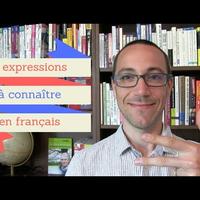3 expressions pour démarrer une discussion en français
Dans la vidéo d'aujourd'hui, je vais partager avec vous trois expressions françaises pour vous aider à démarrer n'importe quelle discussion en français.
Bonjour ! Merci de me rejoindre dans cette nouvelle vidéo de Français Authentique. C'est un problème que vous avez certainement déjà eu, que moi, j'avais souvent quand je vivais en Autriche et que je devais allemand avec quelqu'un. Imaginez, vous êtes avec une personne, elle ne parle pas et vous ne savez pas comment démarrer une discussion. Ça existe, bien sûr, aussi dans notre langue maternelle, mais on a toujours plus de facilité à démarrer la discussion. L'idée ici, c'est que je partage avec vous trois expressions toutes faites, toutes simples, courtes – que vous connaissez peut-être certainement déjà – et qu'on voit comment ces expressions peuvent vous aider à démarrer une discussion. Et vous verrez que c'est vraiment très utile parce que souvent, on a besoin juste d'un petit déclencheur ; on a besoin de quelque chose qui démarre la discussion et une fois que la discussion est démarrée, une fois que vous avez commencé à parler, que les premiers mots ont été échangés, tout le reste est très facile et très naturel.
Donc, on va se focaliser sur ce démarrage de la discussion. La première chose que vous pouvez dire à votre interlocuteur, c'est : « Quoi de neuf ? » C'est une question. Quelque chose de neuf, c'est quelque chose de nouveau, donc, en disant à la personne : « Quoi de neuf ? », vous lui demandez ce qu'il y a de nouveau dans sa vie. Et forcément – c'est ce qu'on appelle une question ouverte ; c'est une question à laquelle on ne peut pas répondre par oui ou par non – votre interlocuteur va commencer à parler de sa vie et vous pourrez démarrer une discussion.
Une deuxième expression simple, claire et qui veut dire la même chose, c'est : « Quelles nouvelles ? » Les nouvelles, ce sont les dernières choses qui sont arrivées dans la vie de la personne. Donc, encore une fois, si vous dites : « Quelles nouvelles ? », ça veut dire : « Quelles sont les nouvelles ? », ça veut dire la même chose que « quoi de neuf ? » Vous demandez à la personne quelles sont les dernières choses qui se sont produites dans sa vie et ça, ça déclenchera immédiatement une conversation, une discussion.
Enfin, vous pouvez dire, de façon très simple : « Ça va ? » C'est encore une question. Vous pouvez aussi dire : « Comment vas-tu ? » et là, vous demandez directement des nouvelles. Dans les deux premières expressions, on demandait quelles étaient les derniers événements ; ici, en demandant si ça va, on prend soin de la personne ; c'est quelque chose de positif et si vous dites ça, la personne ne va pas vous dire : « Oui. » ou « Non. », elle va plutôt essayer de discuter avec vous et de développer une conversation.
Ce sont des expressions très courantes que vous connaissez déjà certainement ; le « quoi de neuf ? », « quelles nouvelles ? », « ça va ? » Il en existe plein d'autres un peu moins utilisées type « la pêche ? » qui veut aussi dire : « la forme ? » Vous pouvez aussi dire : « Ça boom ? » C'est un petit peu démodé ; c'était utilisé il y a très longtemps et ça voulait dire : « Ça va ? » Il y a plein d'autres expressions du type : « Ça roule, ça gaz… » Ce sont des expressions qui veulent dire la même chose, mais concentrez-vous peut-être sur les plus communes dans un premier temps.
Il y a évidemment plein d'autres moyens de démarrer des discussions en français. Vous aurez un très bon exemple en regardant dans le lien en-dessous. Je vous ai mis un extrait de mon pack 3 – vidéos authentiques. C'est un groupe de leçons complet gratuit qui est dans le lien en-dessous sur Facebook et dans le « i » comme info sur YouTube. Ce pack 3 – vidéos authentiques, c'est un pack de leçons où il y a 16 groupes de leçons – là, j'en partage un avec vous – où je discute avec mon frère Jimmy et on discute de façon authentique sans script, sans texte, on ne lit rien, on a juste des grandes étapes ; on sait quoi dire, mais on ne sait pas comment. Et en faisant ça, forcément, on a dû démarrer des discussions et je pense que c'est un bon exemple pour vous. Jetez un petit coup d'oeil dans cet extrait du pack 3 – vidéos authentiques.
A bientôt les amis !

